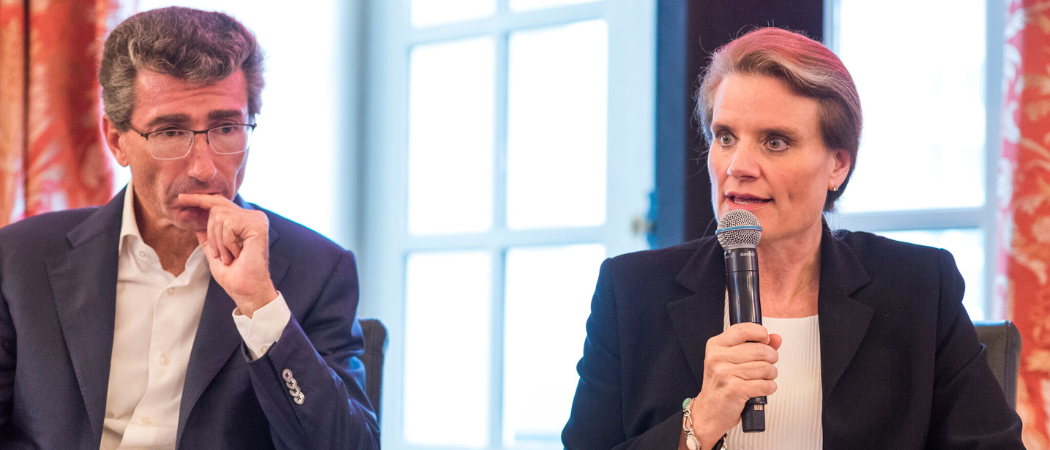Charm offensive aimed at Swiss voters gets under way this autumn

Martina Hirayama, Swiss state secretary for education, research and innovation, and Marc Lemaître, head of the Commission’s research directorate general, at the SwissCore event celebrating Swiss-EU collaboration on September 3. Photo credits: SwissCore / LinkedIn
On the eve of officially signing Switzerland’s late association with Horizon Europe, both sides are thinking about how to avoid renewed disruption when a new set of bilateral accords is brought forward next year.
“Cooperation is not a luxury, it's a strategic necessity,” said Martina Hirayama, Swiss state secretary for education, research and innovation, at an event celebrating Swiss-EU collaboration on September 3.
Swiss participation in EU research programmes has been an off-on affair for years. In 2014, the country temporarily lost full access to Horizon Europe’s predecessor, Horizon 2020, after Swiss voters passed an anti-immigration referendum.
More recently, Switzerland was excluded from Horizon Europe from 2021 to 2024 because of broader disagreements with the EU. This situation was remedied at the end of last year when an association agreement was agreed in principle, and Swiss researchers were granted transitional access to the programme. That agreement is due to be formalised in the coming weeks.
But now a fresh package of bilateral agreements between the EU and Switzerland must be negotiated. These will introduce new institutional rules, including some requiring Switzerland to adopt certain evolving EU internal market regulations. However, the final say on the agreement will once again be in the hands of Swiss voters.
Hence the importance of informing the Swiss population about the crucial role of research collaboration with the EU, according to Simone de Montmollin, president of the commission for science, education, and culture in the Swiss Parliament.
“We will have to explain and clearly demonstrate why Switzerland and the EU are so closely linked. What is happening today at the global level, with major forces ignoring laws, rules and agreements, makes it more evident than ever that we must act together,” de Montmollin told Science|Business. “We need stronger and closer collaboration, not just for Switzerland, but for all EU countries and their citizens.”
To spread this message, the Swiss National Science Foundation (SNSF) and other stakeholders will hold an event on September 16 in Bern to discuss the impact of the Swiss–EU relationship on society, the economy, education, research and innovation.
Related articles:
- Switzerland and EU sign new declaration smoothing path to formal Horizon Europe association
- Swiss take further step towards Horizon Europe association
“It's a difficult discussion in Switzerland because it's a complicated package,” said Astrid Epiney, vice president of the SNSF Foundation Council. However, she expressed optimism that an agreement would be reached, allowing Switzerland to participate in a reliable and durable way in EU programmes.
“The idea is that, in these agreements, Switzerland participates in part of the EU internal market, not the other way around. If you participate in someone else’s internal market, you have to accept the rules,” she told Science|Business.
The EU Council is expected to approve the package of proposals in early 2026, a necessary step before Switzerland can move forward. In spring 2026, the Swiss Federal Council would submit the package to parliament, where both chambers are expected to deliberate for about a year.
By spring 2027, the process could be completed at the parliamentary level, after which the package would almost certainly face a referendum, according to Epiney.
Switzerland joins Horizon Europe
Meanwhile, both Switzerland and the EU are underlining the forward-looking nature of the new Horizon Europe agreement.
“This association is not about returning to a previous model,” Hirayama said. “It is about advancing together with greater ambition, deeper cooperation and rebuilt trust. It signals our shared commitment to science and partnership.”
Marc Lemaître, the head of the Commission’s research directorate general, confirmed that the association agreement is expected to be signed in November. “This is not just getting back as part of the Framework Programme. This is really a new era,” he said, stressing the importance of working with “like-minded democracies” with a proven record in scientific excellence, technology and innovation.
The exclusion from Horizon Europe came with high cost, according to the leaders of the SNSF.
“Many researchers lost possibilities to be in networks [. . .] and that it's still hard to recuperate,” Laura Bernardi, vice president of the Scientific Council of the SNSF, told Science|Business. Not being full associated members also meant that Swiss researchers could not coordinate projects, even if they brought their own funding, limiting their leadership role, she added.





 A unique international forum for public research organisations and companies to connect their external engagement with strategic interests around their R&D system.
A unique international forum for public research organisations and companies to connect their external engagement with strategic interests around their R&D system.